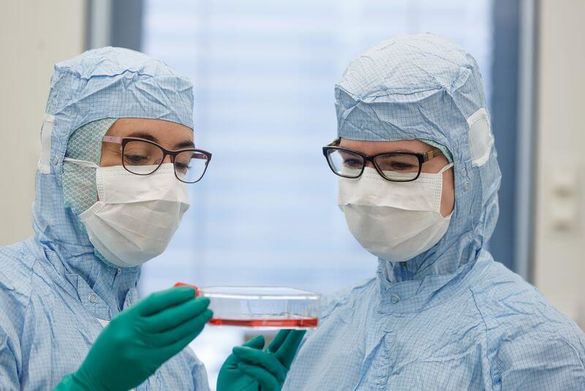CAR T-cell therapy starts in Germany

September 2018
Heidelberg is the first center to offer CAR T-cell therapy in Germany | New cell therapy procedure to treat rare leukemias and lymphomas | Natural immune cells “learn” to attack tumor cells
New therapeutic approach for patients with certain rare, very aggressive immune system tumors: The Department of Hematology, Oncology and Rheumatology of Heidelberg University Hospital is the first German center to implement the certified “chimeric antigen receptor modified T-cells” (CAR T-cells) in the fight against two rare forms of leukemia (blood cancer) and lymphoma (lymph node cancer). Prof. Dr. Peter Dreger, Head of the Stem Cell Transplantation Unit at Heidelberg University Hospital, explains: “The CAR-T technology is a novel and highly effective therapy that uses genetic engineering techniques to modify the body’s own immune cells so they can recognize tumor cells and eliminate them in a targeted fashion.”
The approval of the process is currently limited to diffuse large B-cell lymphoma (DLBCL) and - only in patients under 25 years - to acute lymphatic leukemia (ALL), when standard therapies have failed. Both DLBCL and ALL are uncommon, very aggressive immune system tumors that result in rapid death when untreated, and till now could only be treated with chemotherapy and radiation therapy.
A quantum leap in the therapy of uncommon forms of blood and lymph node cancer
To be certified to apply this new, innovative cancer therapy, a hospital must demonstrate to representatives of the manufacturers that it fulfills requirements of the European Medicines Agency (EMA) for use of these very expensive and highly sensitive agents. This ensures, for example, that the facility has sufficient experience with cell preparation transplantation and provides specially trained personnel as well as intensive medical care facilities to perform the treatment. Prof. Dr. Michael Schmitt, the “Siebeneicher Foundation Professor” for cell and immunotherapy at the Department of Hematology, Oncology and Rheumatology since 2011, sees the new therapy as a quantum leap in cancer medicine. “The new ingredient compound of CAR-T cells enables us to treat immune system tumors that would lead to rapid death without treatment. We assume that a number of additional immune system cancers will be treated similarly in the future.”
The body’s natural immune cells are trained in tumor detection
Genetically engineered CAR T-cells resolve a central problem of cancer therapy: They recognize tumors of the hematopoietic and lymphatic systems that are typically invisible to our natural body defenses. In CAR T-cell therapy, the initial step is to obtain certain immune cells - “T-cells” - from the patient’s bloodstream. These undergo genetic engineering in the laboratory so that their surfaces form CAR molecules directed against cancer-specific surface proteins. The altered CAR T-cells are re-administered to the patient, where ideally they multiply and result in a vigorous and sustained immune response against the cancer. The disadvantages of CAR T-cell therapy are - in addition to very high costs - the potentially intense side effects. This is why it is only approved in hospitals with appropriate intensive care facilities.
The Department of Hematology, Oncology and Rheumatology (Internal Medicine V) at Heidelberg University Hospital led by Prof. Dr. Carsten Müller-Tidow meets these requirements. The hospital has one of the richest traditions in Germany for the treatment and research of blood cancers and is the largest stem cell transplantation center for adults in Germany, with over 300 procedures per year.
Second opinion online & video consultation Further Information

